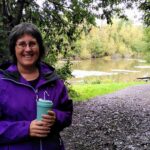I became suspicious that a yeast overgrowth might be involved in my gut problems (see previous post for a full discussion of ME/CFS and gut health) when I became immediately windy and very soon bloated after eating anything with sugar in it. I soon started to have a similar reaction to wheat with the addition of occasional sharp intestinal pains. Soon I was reacting to rye bread and oats too and the fruit smoothies I was eating to satisfy my sweet tooth, were causing similar problems to eating sugar. I scored highly on an online questionnaire designed to indicate the likelihood of a yeast involvement and started on an anti-candida diet. Having got over ME/CFS once before I know how to pace, I know how to manage my energy levels and symptoms, I know how to deal with the emotional impact of the illness. But with all these skills that I learned from getting over my illness the first time I still haven’t got better this time. I put this down to the added strain on my body of my gut imbalance, the extra toxins circulating in my system and the added strain on my immunity. I haven’t totally solved this problem yet but I have faith the when I do it will set me on the path to a full recovery again.
Like many I find the anti-candida diet very hard. I doubt I’ve been strict enough so my problems have just gone on and on. I love food and with so many pleasures in life robbed by lack of energy I really struggle to put such strict boundaries on my food intake as well. I do know that when I’m strict my symptoms do get better so I keep on trying. But I comfort eat, when I get fed up of lack of progress I cheer myself up with eating something that I hope I can get away with, even when I know deep down that I probably can’t. Unfortunately there seem to be more and more foods that cause me to get bloated, so I’m pretty sure I haven’t got the complete picture yet, I don’t know all the answers. I also need to work on how to motivate myself to be strict with my diet.
The principles of tackling a yeast overgrowth:
- Starve it by not eating anything it feeds on, eg sugar and refined carbohydrates.
- Avoid immune reactions by avoiding yeast type foods and drinks
- Probiotics aim to outcompete the yeast in your gut.
- Antifungals aim to kill it
The anti-candida diet:
The idea is to start with a few weeks of a strict diet and then gradually try to reintroduce things that might be problematic (like yeast or fruit or cheese), one at a time, to see if you react. Be warned, it can take months or even years to get rid of this problem once you have discovered what you can and can’t eat, there’s no quick fix. Here is a brief outline of the diet to give you an idea of what you might heave to commit to. For more information there are many websites and books on the subject.
Safe foods:
- All green vegetables and low carb vegetables. Higher carb veg you can eat occasionally (see below)
- Unprocessed meat and fish, tofu, eggs, unprocessed nuts (except peanuts which can have a high mould content) and seeds, cold pressed vegetable and nut oils.
Foods to eat in moderation (to avoid at first):
- Butter, young /soft cheeses, yogurt
- Potatoes (white or sweet), beans, peas and pulses, artichoke, avocado, beetroot, parsnip, sweede, celeriac, fennel and squash/pumpkin.
- Whole grains
- Fruit. Peel fruits that might have yeast on its skin (apples etc.).
Food to completely avoid:
- All processed foods, especially white flour and white pasta
- Foods containing any kind of sugar or honey, molasses, maple sugar, etc. Avoid all sweeteners to start off with too.
- Yeast containing foods including breads, marmite, mature and blue cheeses and all food containing vinegar.
- All processed, smoked or pickled meat and fish
- All mushrooms and truffles
- Sweet fruits like melons and grapes and all dried fruit.
- Leftovers and packaged fruit juices (because they will contain mould)
- Coffee, tea, alcohol and diet drinks
There are a wide variety of probiotic supplements and products on the market. After years taking a healthspan supplement I’m now taking a more expensive preparation called prime selection. There’s been a slight improvement in my symptoms sice I started taking it so i’m going to persist for a while. Many people find they have to experiment with probiotics to find one that suits them.
Antifungal medication can be expensive and will not be prescribed on the NHS as candida overgrowth is not recognised. Here are some of the natural products that are thought to be effective anti- fungal agents:
- Garlic
- Citrocidal (grapefruit seed extract)
- Oregano oil
- Caprylic acid (from coconut oil and palm oil)
- Olive leaf extract.
Fighting a yeast overgrowth can be a difficult battle particularly as symptoms can get worse when you’re winning with the dying yeast releasing more toxins into your blood system. If you feel that a yeast overgrowth might be involved in your gut problems it might be worth enlisting the help of a nutritionist or another alternative health practitioner.




